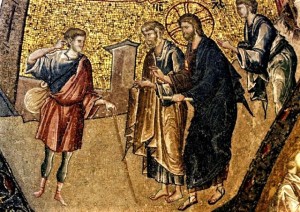All these things … I have not kept from my youth – Metropolitan of Strumica, Naum
In today’s Gospel reading (Matthew 19: 16–26) it can be seen how and why the act of self-justification takes place and what the resulting consequences are.
In all freedom we can conclude that Christ, as God Who knows everything, placed the last request (“If you want to be perfect, go and sell your possessions and give to the poor, then come and follow me!”) before the young man not so much because He really expected him to fulfil the call for perfection (today – monasticism), but only to show him that he had not fulfilled the other commandments of God that he claimed he had previously fulfilled.
Even if we assume that the young man fulfilled God’s commandments, according to his testimony, he certainly did so as those who “put in out of their abundance,” and not as the widow with the two copper coins, who gave “all that she had, all her livelihood.” However such fulfilment of the commandments does not bring spiritual development, but only a high opinion of ourselves.
Likewise, the ascetic-prayer struggle (endeavour) that happens only at a time when the grace of God openly interacts with us, and the cessation of the same struggle when grace is concealed – does not purify us from passions and does not enlighten us. Spiritual development is enabled only by the continuous ascetic-hesychastic struggle at a time when God’s grace is pedagogically hidden from us.
That the young man really did not fulfil the commandments that Christ pointed out to him and did not go through the path of purification from passions and enlightenment of the mind, shows the fact that we do not see the fruits of such a struggle, i.e. he did not recognise Christ as the Lord – neither at the beginning of the conversation nor afterwards.
No matter how much the young man thinks that he is acting honestly or not, the event shows that he is certainly being robbed by being enslaved by a kind of passion and a high opinion of himself, expressed through the great sin of self-justification: “All these things, I have kept from my youth” i.e. the high opinion that he has done everything right.
The passion which the Lord Himself points out as the main obstacle for purifying and opening the heart of the young man is the avariciousness: “… go, sell your property and give to the poor …” But, as we know, the young man went away full of sorrow, for he was very rich; for which he was enslaved and darkened by the passion of avariciousness – of hope, security and comfort in the earthly things.
The words of the young man: “What do I still lack so as to have eternal life?” are nothing else but an indication of having a high opinion of himself, an example of being opinionated.
This conceitedness prevented the young man from noticing the rebuke and caution (with Whom he is speaking), addressed to him at the very beginning of the conversation, which are hidden in the slightly harsh words of Christ: “Why do you call me good? “No one is good, but One that is God.”
Because of that delusion of being opinionated (conceitedness) and because of the passion of avariciousness, the young man goes away sorrowful, thinking that he did everything right, and – behold, he remains misunderstood and unrecognised. Just like us when we do not accept the word and opinion (guidance) of our spiritual father for us.
The passions are the ones that hold the heart captive and closed to the prayer of the mind in the heart, and, the mind is not enlightened.
The passions and demons that are always associated with them are the ones that entangle people with earthly concerns and render them unable to respond to the heavenly call which is constantly addressed to them and to follow Christ wherever He goes. It is the passions and demons that prevent people, even today, from seeing the work of the God-Man Christ through the spiritual fathers of the Church and humbly to obey them; instead of condemning them and justifying themselves.
On the other hand, I feel sorry for them, most often such unenlightened, but also religious sociopaths, are taken by the messianic syndrome and the need for conflict with great authorities, and therefore, it is precisely these people that the demon tries to use to provoke divisions among Christians and weaken the Church in key historical moments. They are easily recognizable. Beware of them!
Most Holy Theotokos, save us!
Metropolitan of Strumica, Nahum
(11.09.2021 15:54)

